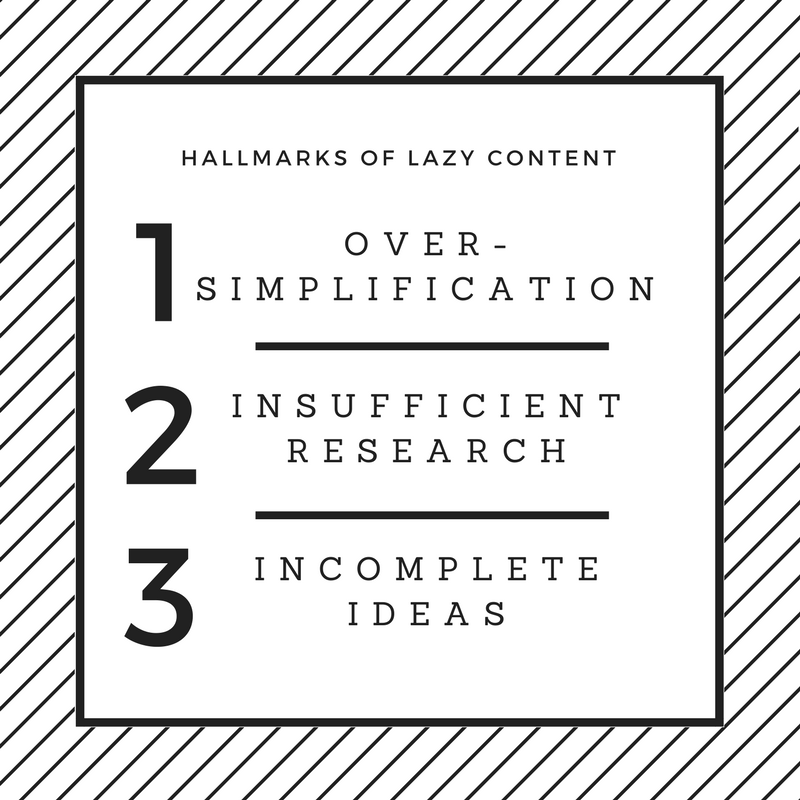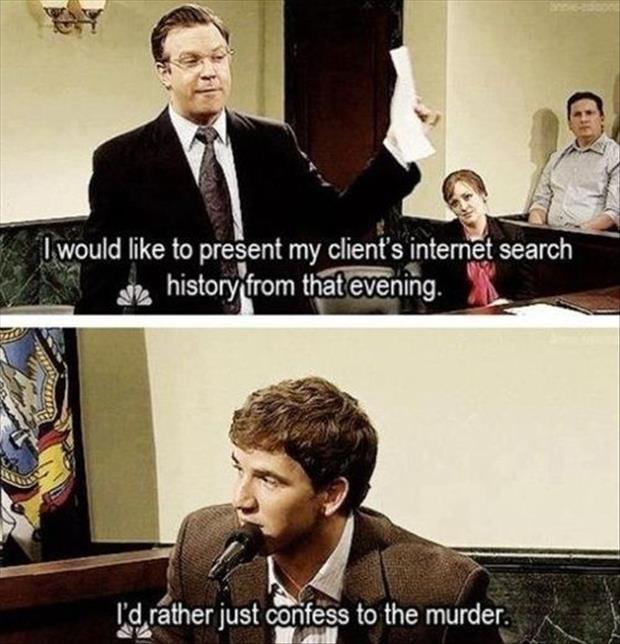There’s a scene in the new Ghostbuster’s movie where Abby points to the reality TV show “Ghost Hunters” and goes, “See! This is why people don’t take us seriously!”
That’s how I feel every time I open my browser and see headlines like “3 Ways To Make More Money By the Holidays.” It’s not a bad headline. On the contrary, it’s a great one.There’s just the tiny problem that the actual content assumes the reader is an idiot.
When you click on the piece, the author recommends (I sh*t you not, this is real advice in a real blog post) that to make money over the holidays you should: “ask for a raise,” “invest your money,” and “launch a side hustle.”
Thank you, Captain Obvious.

“I’m going to show you how to make a pie. Turn on the oven. Learn how to bake! BYE!”
This kind of mediocre content scares the crap out of me. It’s not “bad” content, it’s just…lazy. And lazy content is worse because it masquerades as “good” content.
“Good” content is a euphemism for content that converts. That can mean converting eyeballs to clicks or converting clicks to purchases. “Good” content causes someone to take an action.
“3 Ways To Make More Money By the Holidays,” is “good content” insomuch as it will generate a lot of clicks. It has a great headline, easy skimmable takeaways, pretty pictures, and it doesn’t make you think too much.
Which is precisely the problem.
It’s lazy.

Number four is beautifully manicured images like this. jk jk I KID.
Lazy content offends the sensibilities of your reader
When your content doesn’t deliver on the promise of your headline you’re inadvertently communicating that you don’t respect your readers enough to properly research this topic for them.
In the example above, the reader who thinks the piece will make them money is being made a fool. And the author is the fool creator. It’s the chicken-or-the-egg conundrum of content marketing:
Is it our fault for writing it or your fault for clicking?! MUAHAHAHA
I don’t really care who’s fault it is, I’m invoking Maya Angelou’s law of “When you know better, you do better,” and telling content creators: BE BETTER.
Your audience trusts you with the highest currency you can afford someone: their time and attention
When someone is engaging with your content, that’s time they’re spending away from their children. Away from their friends, their family, their work. They’re choosing to give their greatest asset (time) to you.
When you squander it with sloppy pieces, it’s the ultimate middle finger to the people you purport to care about.
I thought it was strange when Molly Pittman (VP of Marketing and Traffic at Digital Marketer) said, “do not send an email if you don’t have a reason.” (Obviously?) Seemed like a redundant thing to recommend.
Now I see what she meant.
We create a “reason” to write that is about ourselves, not our readers.
- “I want to plug my lead magnet”
- “I need to tell them about this event”
- “I need to put these affiliate links somewhere!”
- “I need to drive traffic to my blog!”
You create the content around your business need instead of your reader’s needs.
And therein lies the nature of the conflict.
Content serves a business end. (You can argue the opposite till your blue in the face, but you’re wrong). And it works. Even lazy content brings in ad revenue, boosts SEO, helps with affiliate commissions, and ToFu leads. That all comes from content that converts, not content that transforms (we’ll get to that in a second).
I understand the impulse to write in order to promote your products and your work. Heck, I do it all the time. You see opt-ins scattered in my pieces, backlinks to old articles, and sometimes I even plug my virtual coworking space or a book you should buy.
But it’s always in service of the idea, which is what great content is about. (and the day it’s not, so help me, Moses, you guys better call me out).
Here’s the problem: in addition to the business case for justifying lazy content, there’s also the human case that producing lazy content is a sh*tty thing to do to someone.
Imagine, for a moment, that you’re in a job you hate. And you’ve been dreaming of running your own business. But you gotta pay your mortgage. So during the day, you’re in sales. Plus, you have 2 kids and alimony payments. It’s not really reasonable to quit your job.
And then….you see the headline “3 Ways To Earn More Money By The Holidays.”
Your heart lights up. The holidays are 3 weeks away!
For a moment, you have hope.
You think, “YES! This will give me the insight I need to make a change in my life! EMANCIPATION!!”
Don’t judge this hypothetical woman btw, you’ve clicked on articles for that reason too. I bet you’d be pretty mortified if we audited your search history. “How to Know If He Really Likes You,” “3 Things That Happen Right Before You’re Fired,” “Is My Poop Regular?” “What Makes Marriage Work – It’s Not What You Think.”
You are this hypothetical woman.
Ok so back to our story: You see the headline and you feel, for a moment, hope.
You click on it, your heart full, the page loads and…
You find garbage.
(Probably well designed, but still…garbage.)
Just like that: lazy content made a good person feel like crap about themselves
It’s mean.
I’m also looking at you, food, wellness, and mommy bloggers posting in perfect lighting and showcasing your fake vulnerability.
The question I want to pose to you is this: Would you appreciate reading the things you write?
Would you feel like the author is respecting your intelligence? Respecting your time?
When you’re in the information business, there is no greater compliment than having been worth someone’s time. It’s the most precious asset we have and if someone is spending it on your work, there is no higher compliment.
Which means you have a duty to hold up your end of the deal: Deliver content that transforms
Great content transforms (told you I’d get back to this point). You reader is no longer the same person they were when they began the piece. They’re more enlightened now. Validated. Secure. Confident. Or perhaps more cautious? Doubting? Cynical? Smarter. More contemplative. Evaluative. Thoughtful.

Like this baby bunny napping. You see this content and you’re a better version of yourself now. Because BUNNY THERAPY WORKS
Doesn’t matter what the nature of the change is (though I strive for it to be a positive one).
When a reader engages with your work, they should leave it transformed. It’s like going to a movie. The goal is to make the audience feel something. Did it make you consider a new side of a story? Learn something about the past? Evaluate a complex situation and wonder about your own ethical backbone in a similar scenario? Escape for 2 hours where you forgot about the heaviness in your heart and just laughed?
That’s the real role of content.
Listen, if you have a message to get out in the world, write your f*cking g heart out. But if you’re trying to scam people or (arguably worse) make a couple hundred dollars by writing crap listicles for blogs that sell ads, you’re part of the problem.
If you think I’m being dramatic, take a look at the numbers. When the judgment is cast, lazy content will be responsible for the rise in anxiety, depression, loneliness, and the dehumanization of our fellow man. (Exhibit A, B, C, D, and E: the election. Where everyone behaved like a child. And no one took responsibility.)
It’s time content creators took full responsibility for the work they put out in the world.
You condescend your readers when you undercut them with lazy, sloppy, careless content
Careless content is not about the topic you choose to cover, but the manner in which you cover it. “10 Walkable Shoes For Travel” can be fantastic content that is incredibly valuable for your readers when you do the proper research and recommend shoes you’ve worn yourself and walked in for miles. You can’t *just* recommend shoe brands that took out an ad on your blog or paid you for a backlink.
We’ve all had fun mocking GaryVee, but he’s been remarkably consistent on one point everyone is ignoring: You have to care.
Don’t create content you don’t want to consume. It’s that simple.
You’re a media company now. You have influence. You have power. People rely on you for information, whether it’s on clothes, upcoming events, how to vote in an election, or how to make money before the holidays.
Don’t squander their attention it with insufficient research, incomplete ideas, and oversimplifications.
The question you must ask yourself (and answer HONESTLY) before you put anything out:
Would I read this?
Would you?






